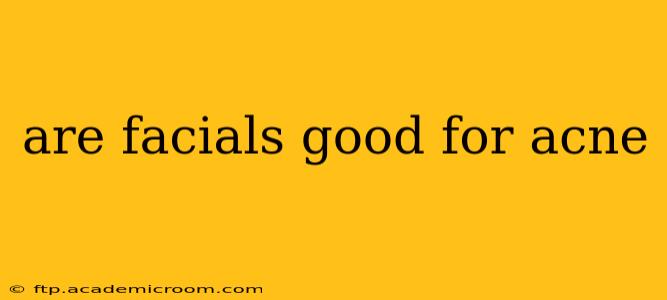Acne. That unwelcome guest that seems to pop up at the most inconvenient times. While battling breakouts, you might wonder if facials, those luxurious pampering sessions, are actually beneficial or could potentially worsen your condition. The answer, as with many skincare questions, is nuanced. Facials can be good for acne, but it depends heavily on the type of facial and your specific skin needs. Let's delve into the details.
What are the Benefits of Facials for Acne-Prone Skin?
A well-chosen and expertly performed facial can significantly improve acne-prone skin. Here's how:
-
Deep Cleansing: Facials go beyond your typical at-home cleanse. Professional extractions remove blackheads and whiteheads, reducing pore congestion, a major contributor to acne. This deep cleansing helps prevent future breakouts.
-
Exfoliation: Accumulated dead skin cells can clog pores, leading to acne. Facials often incorporate exfoliation techniques, either chemical (using acids like salicylic or glycolic acid) or physical (using scrubs), to remove these dead cells and promote cell turnover.
-
Inflammatory Reduction: Some facials utilize ingredients with anti-inflammatory properties, such as soothing masks containing calming botanical extracts. This can help reduce redness and swelling associated with acne.
-
Professional Guidance: Estheticians can assess your skin type and condition, recommending personalized treatments and home care routines tailored to your acne concerns. This professional guidance is invaluable for managing acne effectively.
What Types of Facials are Best for Acne?
Not all facials are created equal. Here are the types that are generally considered beneficial for acne-prone skin:
-
Hydrofacial: This popular treatment uses a specialized machine to cleanse, exfoliate, extract, and hydrate the skin, leaving it clear and refreshed. The gentle nature of hydrofacials makes them suitable for even sensitive skin.
-
Chemical Peels (with appropriate acids): Superficial chemical peels using low concentrations of salicylic or glycolic acid can effectively exfoliate and unclog pores, reducing acne breakouts. It's crucial to consult a dermatologist or licensed esthetician to determine the appropriate peel strength for your skin. Incorrect usage can lead to irritation or damage.
-
Extractions (performed by a professional): Professional extractions are a key component of effective acne treatment. An esthetician with proper training can safely remove blackheads and whiteheads without causing further inflammation or scarring.
What Types of Facials Should You Avoid with Acne?
Certain facials can worsen acne. These include:
-
Facials with harsh scrubbing or aggressive extractions: These can irritate the skin, leading to inflammation and potentially scarring.
-
Facials using comedogenic products: These are products that clog pores, making acne worse. Look for "non-comedogenic" labels on skincare products.
-
Facials that don't consider your specific skin condition: A one-size-fits-all approach to facials is not effective for acne. Ensure the esthetician understands your acne type and severity.
Can Facials Clear Up Acne Completely?
While facials can be a valuable tool in managing acne, they are rarely a standalone solution for severe acne. Facials are best used as part of a comprehensive acne treatment plan that may include:
-
Over-the-counter or prescription medications: Topical treatments like benzoyl peroxide or retinoids are often necessary for significant acne improvement.
-
Dietary changes: Certain foods can trigger or worsen acne for some individuals.
-
Lifestyle adjustments: Stress and lack of sleep can exacerbate acne.
It's important to have realistic expectations. Facials can significantly improve your skin's appearance and reduce breakouts, but they won't magically cure acne overnight.
Are facials worth it for acne?
The cost-effectiveness of facials for acne depends on several factors, including the severity of your acne, the type of facial, and your overall skincare routine. For mild acne, regular facials might be a worthwhile investment as part of a comprehensive approach. However, for more severe acne, facials should be considered alongside other medical treatments. The benefit lies in the combination of professional expertise, deep cleaning, and customized treatments.
How Often Should I Get a Facial for Acne?
The frequency of facials depends on your skin's response and the type of facial. A good starting point is once a month. However, your esthetician may recommend more or less frequent treatments based on your individual needs.
What are the risks of getting a facial for acne?
Risks associated with facials are generally minimal when performed by a qualified esthetician in a hygienic environment. However, there's always a risk of irritation, infection, or scarring if proper techniques aren't followed. Choose a reputable spa or clinic with experienced and licensed professionals.
This information is for general knowledge and doesn't constitute medical advice. Always consult a dermatologist or licensed skincare professional for personalized recommendations and treatment plans for your acne.
